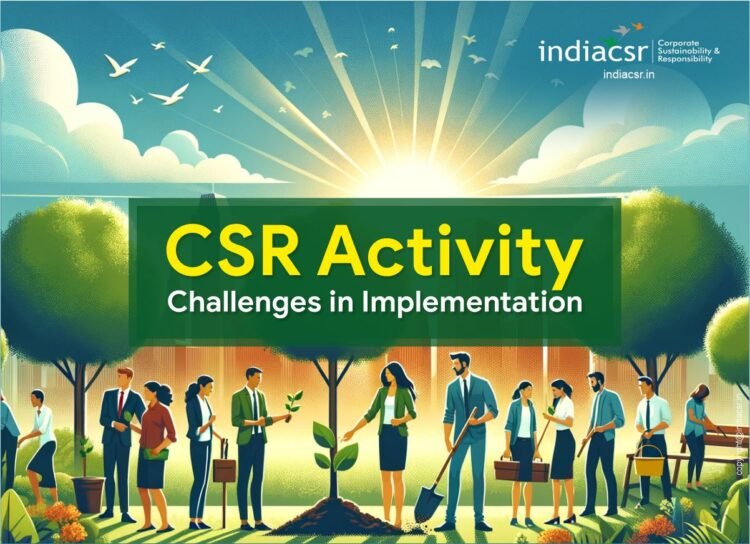Successful CSR initiatives demand meticulous planning, dedication, and active involvement from every stakeholder.
Corporate Social Responsibility (CSR) initiatives are essential for businesses aiming to contribute positively to society while enhancing their brand reputation and stakeholder relationships. However, implementing these initiatives based on comprehensive principles like those outlined by the ISO 26000 framework and demonstrated by successful models such as the Grameen Bank in the previous blog can present challenges.
Understanding these challenges and identifying effective strategies to overcome them is crucial for any organization looking to make a meaningful impact through its CSR efforts.
Bluesky Sustainable Business (BSSB) operates within a structured framework deeply rooted in the principles of ISO 26000, which serves as the cornerstone of its approach to Corporate Social Responsibility (CSR). This framework is characterized by a meticulous integration of stakeholder impact assessments alongside comprehensive evaluations of the implementation of various programs.
These assessments and evaluations are critical components of BSSB’s strategy, ensuring that all CSR initiatives are not only aligned with international standards but are also tailored to meet the unique needs and expectations of stakeholders.
***
Identifying the Challenges
- Resource Allocation: Allocating sufficient resources, including time, money, and personnel, can be a significant challenge, especially for smaller companies or those with tight budgets.
- Stakeholder Engagement: Gaining buy-in and maintaining engagement from all stakeholders, including the Board, implementing partners, and local communities, can be difficult, particularly when the benefits of CSR initiatives are not immediately evident.
- Measuring Impact: Developing effective metrics and methods for measuring the social and environmental impact of CSR initiatives can be complex and time-consuming.
- Cultural and Local Adaptation: Adapting CSR strategies to fit local cultural contexts and address specific community needs can be challenging, particularly for global companies.
***
Strategies for Overcoming Challenges
- Integrated Planning: Integrate CSR initiatives into the company’s overall business strategy and budget planning. This ensures that CSR is not seen as an add-on but as a core component of the business’s long-term success.
A notable example of integrated planning in Corporate Social Responsibility (CSR) involves a prominent conglomerate with a wide range of operations. This organization is distinguished by its commitment to combining economic success with social welfare and environmental sustainability. Rather than viewing CSR as separate or optional, the company embeds these initiatives within its core business strategy.
In particular, the company focuses on fostering community development in areas close to its operations, with strategic investments in education, healthcare, and livelihood enhancement. These initiatives are meticulously aligned with the company’s long-term objectives.
For instance, by investing in local education, the organization not only aids community development but also cultivates a future workforce equipped with necessary skills, which in turn supports the organization’s ongoing growth and stability. This approach exemplifies how integrating CSR into overall business planning can lead to mutual benefits for both the company and the communities it serves.
- Stakeholder Involvement: Engage stakeholders at all levels from the outset. Use surveys, focus groups, and community meetings to understand their needs and expectations, and involve them in planning and decision-making processes. This ensures greater buy-in and relevance of CSR initiatives.
A corporate client excelling in technology, consulting, and manufacturing has established a benchmark in stakeholder engagement through a comprehensive strategy. They conduct surveys and feedback sessions, employ focus groups, and organize community meetings to align their CSR initiatives closely with the needs of various stakeholders, including employees, customers, and local communities. By integrating feedback mechanisms throughout their CSR project lifecycles, they ensure initiatives remain relevant and impactful. This method has enhanced their initiatives’ effectiveness, bolstered their reputation, and fostered stronger community collaboration and support.
- Clear Metrics and Reporting: Develop clear metrics for measuring the impact of CSR initiatives and set up regular reporting mechanisms. This not only helps in tracking progress but also in communicating the impact to stakeholders, thereby sustaining engagement and support.
An Indian IT giant has significantly influenced CSR in India by creating a comprehensive framework to measure its initiatives’ success, focusing on areas like rural education and health. They’ve implemented specific, measurable indicators aligned with the NITI Aayog’s Aspirational District Indicators, ensuring their projects meet community needs and national objectives. The company maintains transparency and stakeholder engagement through regular updates via reports, newsletters, and social media, demonstrating a structured and strategic approach to CSR.
- Local Partnerships: Partner with local organizations, NGOs, and community groups. These partners can provide valuable insights into local needs and cultural nuances, ensuring that CSR initiatives are relevant and effective.

A notable example involves a tire manufacturing company leveraging the power of Self-Help Groups (SHGs) to empower women in rural areas near its factories. By partnering with local NGOs and community groups, the company supported women in starting home-based enterprises, contributing to their economic independence and community development. This collaboration facilitated capacity-building activities, enabling the women to manage their businesses effectively.
The success of these initiatives led to the formation of additional SHGs, amplifying the impact on the community. These efforts align with the government’s goals of promoting SHGs and underscore the importance of local partnerships in ensuring the relevance and effectiveness of CSR initiatives.
- Flexibility and Adaptation: Be prepared to adapt strategies based on feedback and changing circumstances. Continuous learning and flexibility can help overcome unexpected challenges and ensure the long-term success of CSR initiatives.
An example illustrating flexibility in CSR initiatives is demonstrated by a tech outsourcing company, which initially supported government schools by funding infrastructure development. However, when COVID-19 struck, the company quickly pivoted, using its technological expertise to facilitate remote learning for these schools. They provided software, training, and support, adapting their strategy to meet urgent educational needs during the pandemic. This shift from passive financial support to actively leveraging technological strengths highlights the importance of adaptability in CSR efforts, ensuring they remain relevant and effective in changing circumstances.

Conclusion
Implementing effective CSR initiatives requires careful planning, commitment, and engagement from all stakeholders. By understanding the potential challenges and adopting strategic approaches to overcome them, companies can ensure their CSR efforts are not only successful but also sustainable and impactful. Remember, the journey of CSR is a marathon, not a sprint. It requires patience, persistence, and a deep commitment to driving positive change. By facing these challenges head-on and finding innovative solutions, businesses can contribute to a more sustainable and equitable world.
Bluesky Sustainable Business LLP, with its website stands out as a leading expert in inspecting CSR projects’ processes and practices across India. Accredited as an Independent Type A Inspection Body by the National Accreditation Board for Certification Bodies (NABCB), they offer highly trusted CSR Impact Assessment services. Choosing Bluesky ensures a thorough and impartial evaluation of CSR initiatives, fostering transparency and building trust with stakeholders.
(India CSR)






















